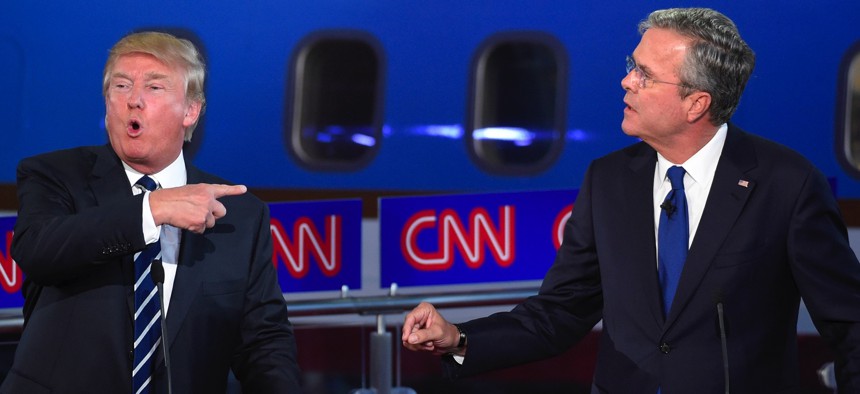U.S. Mayors Have a Message for 2016 Presidential Contenders

Republican presidential candidates Donald Trump, left, and Jeb Bush, at the CNN GOP debate in Simi Valley, California, on Sept. 16. Mark J. Terrill / AP Photo

Connecting state and local government leaders
“We want to refocus the conversation,” says Baltimore Mayor Stephanie Rawlings-Blake. And infrastructure funding and mental health care are among the top issues for the U.S. Conference of Mayors.
The need for greater investment in infrastructure and mental health services, along with finding ways to get federal dollars to cities without state involvement.
Those were some of the key areas a bipartisan delegation of nearly 40 U.S. mayors focused on as they gathered in Baltimore over the weekend. The city executives were working to nail down a set of issues they’d like Congress and the 2016 presidential contenders to prioritize.
Public safety and income inequality were two other topics that received attention.
Once established, the mayors’ priorities will be outlined in a document titled the “Compact for a Better America,” which will call on the presidential candidates and federal lawmakers to take greater heed of matters affecting the nation’s metropolitan areas.
The meeting, which ran from Friday to Sunday, was held by the U.S. Conference of Mayors. Those in attendance serve as part of the organization’s leadership. They also discussed what the direction of the organization would be in the upcoming year.
Although the compact had not been finalized, the mayors held a press conference on Saturday where they offered some insight into what the document would include.
“This campaign has not been wholly focused on issues that matter most to working families,” Baltimore Mayor Stephanie Rawlings-Blake, who is also the president of the U.S. Conference of Mayors, said during the news conference, referring to the primary contests for the Democratic and Republican presidential nominations.
“We want to refocus the conversation,” she added.
Many of the mayors who spoke on Saturday stressed the need for infrastructure funding.
“In order for us to do our work, we’re going to have to have the appropriate level of focus on roads, bridges, tunnels and infrastructure investment,” said Kasim Reed, mayor of Atlanta.
Reed, who is a Democrat, expressed a strong preference for cutting state governments out of the loop when it comes to delivering federal money to cities.
“The time has come to take the handcuffs off of cities’ productivity by causing us to go through states for the resources that we need,” he said. “We could do so much more if we develop a formula that delivers real dollars to mayors in a faster, more efficient way.”
Pointing to a $30 million grant the U.S. Department of Housing and Urban Development awarded Atlanta last week, which will help fund housing revitalization efforts in parts of the city, Reed said: “We know what to do with those dollars.”
Oklahoma City Mayor Mick Cornett, who is vice president of the Conference of Mayors, alluded to infrastructure as well, citing the obligations cities have to maintain smooth roads and clean drinking water. He also noted that first responders were facing a growing number of responsibilities.
“How are we going to fund all of these things?” he asked.
Cornett is a Republican who first took office in March 2004, and is the first mayor in Oklahoma City’s history to be elected to four terms, according to his office.
“We need a president who’s willing to be a partner,” Cornett said. “Who’s willing to direct revenue directly to cities and not go through states and impede the process.”
The meeting in Baltimore began just one day after a 26-year-old gunman shot and killed nine people at Umpqua Community College in Roseburg, Oregon. Asked about mass shootings, which have occurred with frightening regularity in recent years, the city executives sidestepped the divisive politics of gun control, and instead focused on the need for mental health services.
“A lot of us would say, regardless of where you stand on the issue of gun regulation, we know that the trajectory of violence would be changed, one, by robust mental health plans that actually reach people, that reach the grassroots and destigmatize mental health services and, two, by reaching a lot of our young people earlier with educational opportunities,” New York City Mayor Bill de Blasio said.
“We will bring that into the national debate and the presidential debate in a very sharp manner,” the first-term Democrat added. “We’re not going to accept a national discourse that leaves out issues like mental health, or leaves out issues like early childhood education.”
Cornett also raised the topic of mental health services. “We have turned our penal institutions into mental hospitals,” he said. “There’s been a breakdown in how we’re funding mental health.”
“These acts of violence are just one of the repercussions,” Cornett added.
Rawlings-Blake, a Democrat, has said she will not seek re-election in 2016. Her city was rocked earlier this year by unrest and riots following the death Freddie Gray. Gray, a 25-year-old black man, died after sustaining a severe spinal cord injury while in police custody.
The Baltimore mayor noted that, despite economic successes in cities across the U.S., many residents lack opportunities and “fear for their safety, and many feel disconnected from the broader community.” She added: “This is something that I’m especially aware of.”
New York’s de Blasio touted the importance of cities in the U.S.
“We are the ultimate engines of the national economy,” he boasted. “That’s much more true today than it was even 10 or 20 years ago.” He also said: “None of the presidential candidates can afford to ignore the cities.”
Bill Lucia is a Reporter for Government Executive’s Route Fifty.
NEXT STORY: Miami’s New ‘Housing First’ Approach for Homelessness; Nevada Breathes a Sigh of Relief





